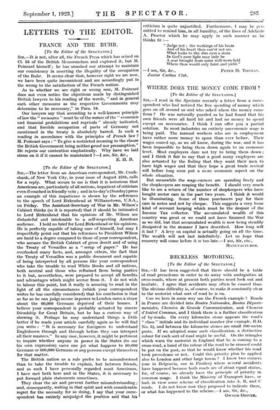[To the Editor of the SPECTATOR.] Sut,—The letter from an
American correspondent, Mr. Cruik- shank, of New York City, in your issue of August 25th, calls for a reply. What occurs to me is that it is notorious that Americans are, particularly of all nations, impatient of criticism even if couched in friendly vein ; and in to-day's (Sunday) press an example of this impatience is shown by the references to the speech of Lord Birkenhead at Williamstown, U.S.A., on Friday. The Assistant-Secretary of War in Mr. Wilson's Cabinet thinks (so it is reported) that it should be intimated to Lord Birkenhead that his opinions of Mr. Wilson are distasteful and intolerable to a self-respecting American audience. I hold no brief for Lord Birkenhead or his opinions. He is perfectly capable of taking care of himself, but may I respectfully point out that his references to President Wilson are lucid to a degree compared to those of your correspondent, who accuses the British Cabinet of gross deceit and of using the Treaty of Versailles as a "scrap of paper." He has overlooked many facts, and, amongst others, the fact that the Treaty of Versailles was a public document and capable of being interpreted by all persons like your correspondent who take the trouble to read White Books and all nations, both neutral and those who refrained from being parties to it but, nevertheless, were prepared to accept all benefits and advantages which might accrue from it. I do not wish to labour this point, but it really is amusing to read in the light of all the circumstances (which your correspondent writes he has carefully considered) that his conclusion is that so far as he can judge no one in power in London cares a straw about the 60,000 Germans deprived of their houses. I believe your correspondent is probably actuated by sincere friendship for Great Britain, but he has a curious way of showing it. Perhaps he may understand things a little better if he reads your article carefully again as he will find you write : "It is necessary for foreigners to understand Englishmen through and through before they can interpret all their nuances." In any case, however, it might be pertinent to inquire whether anyone in power in the States (to use his own expression) cares one jot what happens to 60,000 Germans or 600,000 Germans or any persons except themselves for that matter.
The British nation as a rule prefer to be misunderstood than to take the trouble to explain, but between friends, and as such I have personally regarded most Americans, I have met both here and in the States, it is necessary to put forward plain statements sometimes.
They clear the air and prevent further misunderstanding ; and, consequently, writing in that spirit and with considerable regret for the necessity for so doing, I say that your corre- spondent has entirely misjudged the position and that his criticism is quite unjustified. Furthermore, I may be per- mitted to remind him, in all humility, of the lines of Adelaide A. Proctor which he may apply in such manner as he thinks fit :—
"Judge not ; the workings of his brain And of his heart thou can'st not see. What looks to thy dim eyes a stain In God's pure light may only be A scar brought from some well-worn field Where thou would only faint and yield."
Junior Carlton Club.


































 Previous page
Previous page